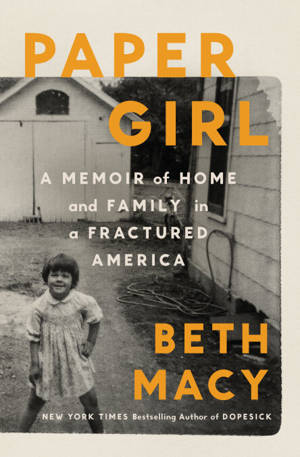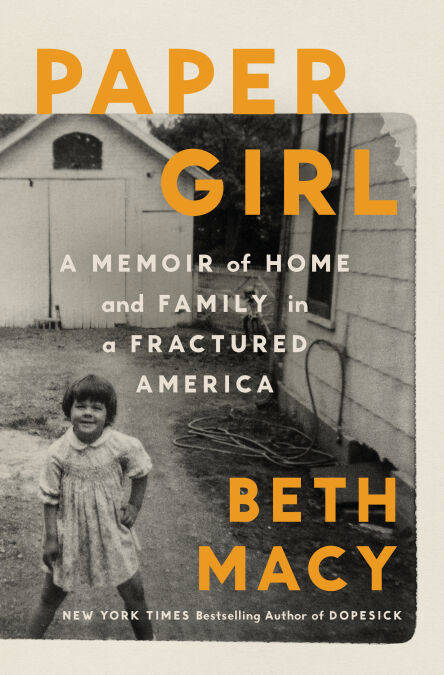
- Retrait gratuit dans votre magasin Club
- 7.000.000 titres dans notre catalogue
- Payer en toute sécurité
- Toujours un magasin près de chez vous
- Retrait gratuit dans votre magasin Club
- 7.000.0000 titres dans notre catalogue
- Payer en toute sécurité
- Toujours un magasin près de chez vous
16,76 €
+ 16 points
Format
Description
Named a Most Anticipated Book of 2025 by People, Boston Globe, Chicago Tribune, Bustle and more
From one of our most acclaimed chroniclers of the forces eroding America’s social fabric, her most personal and powerful work: a reckoning with the changes that have rocked her own beloved small Ohio hometown
Urbana, Ohio, was not a utopia when Beth Macy grew up there in the ’70s and ’80s—certainly not for her family. Her dad was known as the town drunk, which hurt, as did their poverty. But Urbana had a healthy economy and thriving schools, and Macy had middle-class schoolmates whose families became her role models. Though she left for college on a Pell Grant and then a faraway career in journalism, she still clung gratefully to the place that had helped raise her.
But as Macy’s mother’s health declined in 2020, she couldn’t shake the feeling that her town had dramatically hardened. Macy had grown up as the paper girl, delivering the local newspaper, which was the community’s civic glue. Now she found scant local news and precious little civic glue. Yes, much of the work that once supported the middle class had gone away, but that didn’t begin to cover the forces turning Urbana into a poorer and angrier place. Absenteeism soared in the schools and in the workplace as a mental health crisis gripped the small city. Some of her old friends now embraced conspiracies. In nearby Springfield, Macy watched as her ex-boyfriend—once the most liberal person she knew—became a lead voice of opposition against the Haitian immigrants, parroting false talking points throughout the 2024 presidential campaign.
This was not an assignment Beth Macy had ever imagined taking on, but after her mother’s death, she decided to figure out what happened to Urbana in the forty years since she’d left. The result is an astonishing book that, by taking us into the heart of one place, brings into focus our most urgent set of national issues.
Paper Girl is a gift of courage, empathy, and insight. Beth Macy has turned to face the darkness in her family and community, people she loves wholeheartedly, even the ones she sometimes struggles to like. And in facing the truth—in person, with respect—she has found sparks of human dignity that she has used to light a signal fire of warning but also of hope.
From one of our most acclaimed chroniclers of the forces eroding America’s social fabric, her most personal and powerful work: a reckoning with the changes that have rocked her own beloved small Ohio hometown
Urbana, Ohio, was not a utopia when Beth Macy grew up there in the ’70s and ’80s—certainly not for her family. Her dad was known as the town drunk, which hurt, as did their poverty. But Urbana had a healthy economy and thriving schools, and Macy had middle-class schoolmates whose families became her role models. Though she left for college on a Pell Grant and then a faraway career in journalism, she still clung gratefully to the place that had helped raise her.
But as Macy’s mother’s health declined in 2020, she couldn’t shake the feeling that her town had dramatically hardened. Macy had grown up as the paper girl, delivering the local newspaper, which was the community’s civic glue. Now she found scant local news and precious little civic glue. Yes, much of the work that once supported the middle class had gone away, but that didn’t begin to cover the forces turning Urbana into a poorer and angrier place. Absenteeism soared in the schools and in the workplace as a mental health crisis gripped the small city. Some of her old friends now embraced conspiracies. In nearby Springfield, Macy watched as her ex-boyfriend—once the most liberal person she knew—became a lead voice of opposition against the Haitian immigrants, parroting false talking points throughout the 2024 presidential campaign.
This was not an assignment Beth Macy had ever imagined taking on, but after her mother’s death, she decided to figure out what happened to Urbana in the forty years since she’d left. The result is an astonishing book that, by taking us into the heart of one place, brings into focus our most urgent set of national issues.
Paper Girl is a gift of courage, empathy, and insight. Beth Macy has turned to face the darkness in her family and community, people she loves wholeheartedly, even the ones she sometimes struggles to like. And in facing the truth—in person, with respect—she has found sparks of human dignity that she has used to light a signal fire of warning but also of hope.
Spécifications
Parties prenantes
- Auteur(s) :
- Editeur:
Contenu
- Nombre de pages :
- 368
- Langue:
- Anglais
Caractéristiques
- EAN:
- 9780593656747
- Date de parution :
- 06-10-25
- Format:
- Ebook
- Protection digitale:
- Adobe DRM
- Format numérique:
- ePub

Les avis
Nous publions uniquement les avis qui respectent les conditions requises. Consultez nos conditions pour les avis.






